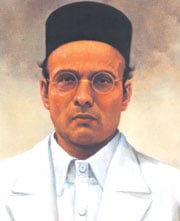 |
Oh Motherland,
Sacrifice for you is like life! Living without you is death!! – Veer Savarkar, The ideal form of Warrior energy |
Veer Savarkar (Born 28th May 1883) was a visionary, revolutionary patriot and a brilliant personality. His name has been carved in golden letters not only in the history of India but also in the history of the world ! The nation was his whole and soul; therefore, the extraordinary literature he created has the national interest at heart. There have been many a litterateur and even several revolutionaries; but there is no revolutionary litterateur like Veer Savarkar !
Veer Savarkar historic leap at Marseilles
Veer Savarkar was arrested by the British and was being taken on the ship Morea, to be prosecuted in India. The ship halted at the Marseilles port in France. On the morning of 8th July 1910, Savarkar was escorted to the bathroom by the guards. Here, Savarkar contorted himself and leaped through the port-hole into the sea beyond. The skin on his chest peeled away, but Savarkar swam towards freedom. By that time, the guards noticed that he had escaped, Savarkar had climbed a 9 foot tall quay and was in France. After running for some distance, he surrendered to French police.
The guards who came after Savarkar bribed the French police and forcibly took Savarkar back to the ship.
The arrest of Savarkar on sovereign land of France raised a storm in the International circuit. Veer Savarkar became the first Indian patriot whose case was fought in the International Court of law ! His leap continues to inspire patriots !
Veer Savarkar’s advice to his young wife prior to being shipped to Andaman jail !
‘If God wills, we will meet again. Till then if you get drawn to ordinary worldly matters; then think about the birds making a nest by collecting straws or ordinary people raising children etc. If you want to take it to higher level, think about sacrificing our household matters in the interest of thousands of houses of those who would be benefited. There are many instances of people dying in the epidemic of plague, hundreds of houses have been deserted or in some case where either a groom or bride meets death right in the middle of wedding ceremony due to destiny ! Think of these things and face the problem with fortitude.” – Veer Savarkar (Ref.: Mazi Janmathep)
Protection of country should be the primary concern of our writings !
As the President of ‘Marathi Sahitya Sammelan’ held in 1938 in Mumbai, litterateur Savarkar had one message to all Hindus. Veer Savarkar, in his address said, “Finally, I have to say that literature is secondary or third in the list of duties in the present situation of our country; so all writers, the wise, think whether literature is meant for life or life meant for literature ? If literature is a secondary thing of our national life, the basic concern of our literature should be protection of such national life and it should be our main goal. I have respect for an artist, for his art. Even if such artists are engrossed in presenting their art and the theatre catches fire, then everyone will rush to save themselves, and art will take second priority. Similarly, when the country is going through grave problems, what is the use of literature ?”
Discard your pens and wield weapons !
“Therefore, you should also discard your pens and wield weapons. Even if a single sonnet is not penned down by any youth in next decade, it wouldn’t matter; it wouldn’t matter even if such literati meets are not held; but we must see thousands of soldiers going in every lane; all over the country, carrying new guns and parading through camps.”
Apt solution to Pakistani army’s mischief !
Pakistan’s army was invading Indian regions before 1965 war, killing Indian citizens; but Pakistan used to claim that their soldiers entered Indian Territory by mistake. During Savarkar’s meeting with Major General Paranjape, he said, “If Pakistan’s soldiers come to India by mistake, what’s wrong with our soldiers going there and attacking ‘by mistake’?” Major General Paranjape said, “How is it possible Tatya ? How can we patrol the 1500 miles long border ? Where to stop them and what to do ?” Veer Savarkar immediately said, “Is the problem of 1500 miles border faced only by us and not by them ? They can come inside and attack. What is your objection ? Even you go to Lahore one day by mistake and take over Lahore !” Maj. General Paranjape was dumbfounded on hearing this.
Veer Savarkar curbs insolence of Muslims in Andaman !
Veer Savarkar was jailed in Andaman. Food used to be cooked separately for Hindu prisoners and Muslim prisoners. Just before mealtime a Muslim prisoner used to touch the food cooked for Hindu prisioners and leave. Hindu prisoners used to fear that if they consume food touched by Muslims, they would be converted. They didn’t have food for 4-5 days out of this fear. Savarkar heard about it and felt that an apt reply would have to be given for those attacking Hindu Dharma. Savarkar then found an effective but simple solution. He took some water in a coconut-kernel and sprinkled it on all food saying the shloka of ‘Apavitra pavitro va….’ and said, “Now this food is charged; therefore, whoever has this food, will become Hindu.” Owing to this, Muslims had to starve; so they withdrew and all started having food respectively cooked for them.
Savarkar noticed that Hindu prisoners were converted to Islam under duress of Pathani officers. Muslims used to systematically spread Islam amongst Hindus in the jail with connivance of all Muslim inmates. Savarkar did the very difficult job of opposing such coercion at Andaman prison and he had to also start purification of Hindus in jail.
Savarkar first advised Hindus not to be ashamed to say that they were Hindus
“Do not think that it is inferior or anti-national to say that you are a Hindu. Do not be ashamed to take pride in worshipping Shriram, Shrikrushna, Chhatrapati Shivaji, Maharana Pratap and Guru Govind Singh. There has to be one country in this galaxy for Hindus and they should prosper in their country. For that, pay attention to their purification (taking back converted Hindus) and their unification ! Purification work is not only religious but also political.” – Veer Savarkar
If we forget Shriram then …….. !
Veer Savarkar had immense reverence for Shriram and Shrikrushna. He used to say that both were army-Chiefs and supreme leaders of this country. In 1909, he celebrated Vijaya-Dashami in London. Remembering the work done by Prabhu Shriramchandra during his era, he said, “When Shriram gave up his kingdom, superficially to obey his father’s word, but mainly for eradication of demons, He did a great job. When Shriram attacked Lanka and got ready for the unavoidable and righteous battle, that of slaying Ravana, His work was superior. But when he left Seeta in forest even after she proved herself, as per the saying ‘Aaraadhanaay Lokasya Munchato Naasti Me Vyathaa’, His work as an incarnation was supreme. He gave up His personal duty and duty towards His family for His duty as a leader of people and a King. O Hindus, till you keep Rama’s work as His incarnation and His idol in your heart, there is hope of your regress easily getting stopped. Till the son of Dasharath, brother of Lakshman, master of Maruti and husband of Seeta is in Hindustan, it is easy to accomplish Hindustan’s progress; but when we forget Shriram, nothing will remain. The Congress rulers have however, forgotten Shriram and none of the literary giants feels like admonishing them. Is it misfortune of this country or regress of the literary acumen ?
The greatness of India in the eyes of Veer Savarkar
According to Savarkar, the proponent of Hindu Mahasabha, was of the opinion that this land has been sanctified with the holy water from the tireless penance of Saints like Vasishta and Namdev. The prose of Maharshi Vyas and Bhagavadgeeta of Shrikrushna are the epitome of literature.
Ramayan is the nourishing ksheersagar. Great women like Damayanti, Savitri, Gargi and Seeta were born in this land. Researchers like Kanad, Bhaskar, Aryabhat, Varahamihir; seers like Mahavir, Shankara, Ramanuj, Nanak, Dayanand, Vivekananda became one with the great history of the land.
Awareness created by Savarkar keeps large part of area under Hindus rule during partition of Hindustan !
In 1937, Savarkar’s house arrest from Ratnagiri was lifted and he was granted permission to take part in politics; but till then, freedom fight under leadership of Gandhi had moved towards undivided Pakistan, instead of undivided Hindustan. Even in such situation, Savarkar showed such bravery that one would feel that he was in the category of ‘Tadaatmaanam Srujaamyaham’. Savarkar was the lone fighter but was full of inspiration from history and traditions, moral values and will power. He stopped the speedy train of Indian freedom fight running on rails towards Pakistan with both his hands and lifting the engine, brought it back to the rails of undivided Hindustan. Savarkar was fighting alone on four fronts against the British Government, Congress, Muslim League and misled Hindus who were confused with the non-violence principle. In this turmoil, however, some part of this great country slipped creating Pakistan and the rest of the country however, stayed available to Hindus. Savarkar was neither tired nor disheartened. He was busy in convincing the helpless, tired Hindus that with one shock, the newly created Pakistan can be destroyed.
Credit of independence given to even unsaid prayers …..… !
India’s freedom does not belong to a single party, any individual or select group. It belongs to the common man. I will go even further and say that those who didn’t take active part in either armed or unarmed secret or open freedom movement; the credit for this national victory also goes to our millions of brethren who had empathy in their heart and made heartfelt prayers expressed or otherwise. – Veer Savarkar, 1952
Promoting words from a foreign language in lieu of one’s own is akin to adopting children after murdering your own!
Many people prefer to use foreign words to describe certain things, even though our own indigenous languages have good synonyms. Also, it is possible to create new words due to the vast list of root words which can describe everything. Use of words from foreign languages like English or Urdu should be strongly discouraged. Because neglecting our own language to embrace foreign words is like killing one’s own children only to adopt more. (e.g. There are words like Loksabha, Vidhi Mandal, Prajasabha etc; but Gwalior uses ‘Majalis-e-aam’!)
(Ref. Sanatan’s forthcoming publication on ‘Bhasha-shuddhi (puritfication of language)’ Point 1. Main purpose of Bhasha-shuddhi)
Age was just a number to Savarkar !
S. P. Gokhale once asked Veer Savarkar, “Tatya, considering your advanced age and weak body, would you be actually able to use the knife you keep with you ?”
Savarkar replied, “It is true that I am tired and ageing. There is no likelihood of anyone attacking me here; but these are all assumptions. Let us suppose you have assumed correctly, then my possessing a weapon may prove fruitless, but will not cause any harm. But what if your assumption is wrong? It happened in the case of Swami Shradhanand. Abdul Rashid guessed rightly that the Hinduswould have been lulled into a sense of false security. So in case someone attacks me, I will fight and if I have to accept defeat due to my failing strength, i would not feel bad; but I would feel very bad if I fall down without trying to retaliate. I have fought whole of my life and I would like to die while fighting my attackers. Generally one does not face situations where use of weapons is necessary; but if such a situation were to arise, it would not help to simply repent. More than often, just possessing a weapon will suffice.”
Literature
Veer Savarkar was a prolific writer; among his works are books like ‘Atharashe Sattavan che Swatanytrya Samar’ (The 1857 war of Independence), ‘Hindu Padapatshahi’ (Hindu Empire), ‘Saha Soneri Paane’ (6 Golden Pages of Indian History), ‘Shikhancha Itihas (The Sikhs – unpublished) and different plays and novels etc.
Far-sightedness of Veer Savarkar towards military policy !
Veer Savarkar was always ready to sacrifice his life to free our country from the British and was one of the most valuable personas the country has seen. He strived hard to see that India should have a competent military policy. Today, when we see lack of adequate manpower in our armed forces, we realize the importance of foresight of Veer Savarkar. This is about his vision of military policy in brief….
A. Savarkar and Subhashbabu dreamed of an armed, militarily able India !
When we were small, grandparents used to tell us stories which would inculcate good moral values in us. There would be one character who would face hardships while trying to reach his goal; but in the end success would always welcome him with open arms. But this hero of the Indian freedom struggle, Savarkar, never received his due honour and lived a life bereft of any recognition. However, he never regretted the lack of recognition because he just abided by the endless vow which he had taken to sacrifice everything for the country. He was the modern day equivalent of Sage Dadhichi. Even today, I distinctly remember the public felicitation program held on the grounds of S. P. College in Pune on the 15th June, 1961 in which he was felicitated by Senapati Bapat. Savarkar had started his speech as ‘Probably, I am not a patriot in your eyes; but at least don’t insult me by branding me as a killer or anti-national’. Today, Inda’s armed forces sorely lack young officers. Our country’s planes need pilots. However, in the 1940s, when Veer Savarkar exhorted youth to join the army (administered by the British), he was labeled as a ‘collaborator, anti-national’. The British were encouraging Muslim youth to join the Indian Royal Army, Navy and Air Force by sidelining the Hindus, which was an insult of the Hindu warrior spirit (Kshatratej). The armed forces were filled with people whose allegiance lay with the British. Savarkar realised the dangers that this was leading to, and when the Second World War started, he demanded that the Hindus become militarised. Savarkar did not even spare literary meets to publicise his ideas, wherein he exhorted youth to give up their pens and pick up guns for the sake of the Nation. More than one hundred thousand young men joined the armed forces due to Savarkar’s heartfelt pleas. Subhashchandra Bose was busy building an army of trained prisoners of war, which we know as the Azaad Hindu Fauj. The growing military might of the Indians from within and outside was what made the British leave India. Therefore, it is imperative to say that Savarkar and Netaji Subhashchandra Bose were the promoters of Indian Armed Forces.
B. Veer Savarkar motivated the army even during period of crisis !
The condition of Hindustanis joining the British army was worse than ‘untouchables’; because the other people were disowning soldiers as traitors and anti-nationals; whereas British officers used to insult them by calling them as black men. In such situation, Veer Savarkar used to motivate the soldiers by telling them to turn their guns in opposite direction once they felt that freedom was in sight and exhibit their ‘Kshatra-Tej’ and same thing happened. In 1946, the Royal Indian Naval (RIN) forces based in Mumbai revolted and The British Prime Minister Lord Atlee later confided to a Governor of West Bengal, it was the RIN revolt and the rising influence of INA that made the British realise that the Indian soldiers could not be trusted to side with the British officers and it would be wise to leave India at the earliest. It was the victory of Savarkar’s recruitment of soldiers program and the year was 1945.
C. India’s defeat in 1962 a consequence of not heeding to Savarkar !
The then Indian Government, advocating principles of non-violence, peace and brotherhood, was constantly warned by Veer Savarkar to be competent in the defence field and be prepared for protection of the country. He was making the Government aware of the hidden expansionist ambitions of China. Sardar Patel and Savarkar, insisted that it was necessary to pay attention to the 7 sisters i.e. the North-East region for its protection while building our armed forces. (Those interested should study the letter written by Sardar Patel to Jawaharlal Nehru (on 7 November 1950), 38 days before his death; a letter which was completely ignored by our peace and fame crazed leaders). Demand for high altitude warfare training by our soldiers and Chiefs of the Defence Forces was also overlooked. As a result, we had to suffer a shameful defeat at the hands of China in 1962.
D. Savarkar’s policy on defence was disregarded !
Veer Savarkar was quite firm about India’s strategies and re-building armed forces so that her word would have some value in international politics. Had the leaders and thinkers followed Savarkar’s advice today India’s word would have held weight in international circles.
-Shri. Vinayak Shridhar Abhyankar (writer is a former military officer).
The great revolutionary, visionary leader, writer, playwright and poet Veer Savarkar voluntarily discarded his physical body on 26th February 1966 at Mumbai through ‘prayopaveshan’.

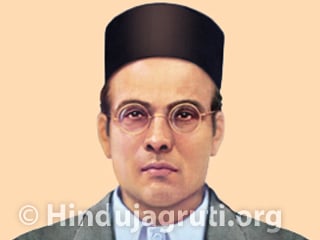
 Life History of Subhash Chandra Bose : Father of the Indian Freedom
Life History of Subhash Chandra Bose : Father of the Indian Freedom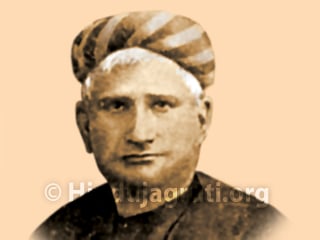 Bankim Chandra Chattopadhyay - The composer of National Song ‘Vande Mataram’
Bankim Chandra Chattopadhyay - The composer of National Song ‘Vande Mataram’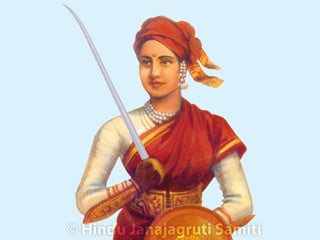 Jhansi ki Rani - Rani Lakshmi Bai
Jhansi ki Rani - Rani Lakshmi Bai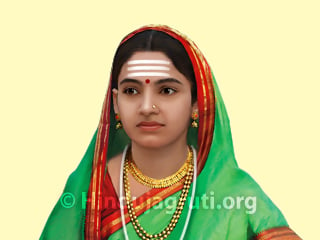 Kittur Rani Chennamma : Earliest ruler to fight British rule
Kittur Rani Chennamma : Earliest ruler to fight British rule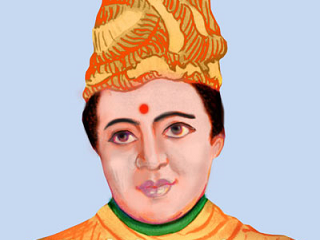 Rani Tapaswini: Combination of Brahmatej and Kshatratej
Rani Tapaswini: Combination of Brahmatej and Kshatratej